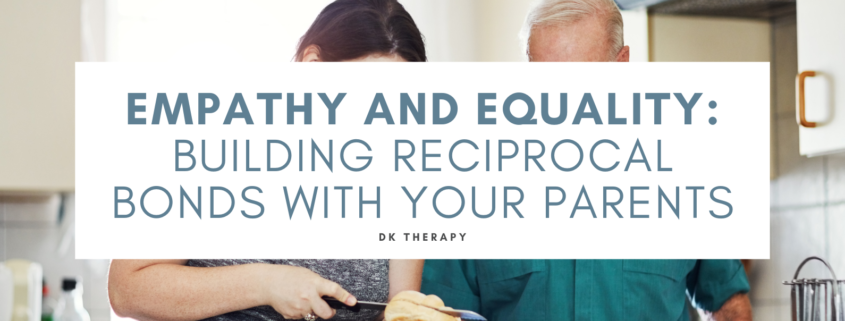Empathy and Equality: Building Reciprocal Bonds with Your Parents
When the demands of everyday life call, maintaining a strong bond with our parents can sometimes be a challenge. However, developing relationships based on empathy and equality can create a deeper, and more meaningful connection among families.
This bond can enrich both your life and the lives of your parents, which creates a reciprocal relationship that’s built on trust and understanding from all parties involved.

Empathy and Its Role in Relationships
Empathy refers to the ability to understand and share another person’s feelings. This allows individuals to step into someone else’s shoes and experience their emotions from a personal standpoint.
When applied to parent-child relationships, empathy can close generational gaps and create a deep, meaningful understanding of one another’s experiences and perspectives.
Being Empathetic Toward Your Parents
To practice empathy when interacting with your parents, try the following techniques.
- Practice Active Listening: Pay close attention to what your parents are saying without interrupting. Acknowledge their feelings and thoughts without judgment.
- Ask Questions: Show interest in your parents’ lives by asking about their experiences, challenges, and things they enjoy.
- Share Your Feelings: Open up about your own emotions and experiences. Vulnerability can foster mutual understanding and connection between yourself and your parents.
- Be Patient: Understand that generational differences can lead to misunderstandings between ourselves and our parents. Be as patient as you can and give each other the time needed to express yourselves.
The Importance of Equality in Families
In a loving family, all members should feel equal to one another and be able to find common ground. Equality in the parent-child relationship is about recognizing and valuing one another’s opinions, experiences, and family contributions. Having mutual respect and seeing each other as equals can create a partnership where both adult children and their parents feel valued and heard.
How to Cultivate Equality with Your Parents
To create an environment of equality in your family unit, try the following practices.
- Mutual Decision-Making: Involve your parents in decisions that affect both of you. This can range from family matters to personal choices that might impact them later, depending on decisions made.
- Respect Boundaries: Understand and respect each other’s boundaries. This includes respecting their need for space and independence, just as they respect yours.
- Share Responsibilities: Whether it’s household chores or providing emotional support, sharing responsibilities can develop a strong sense of partnership and equal value in a family.
- Acknowledge Achievements: Celebrate each other’s successes and acknowledge each other’s efforts. Show that you’re proud of your parents when they accomplish something, just as they do when you reach a new milestone in your life.
Building Reciprocal Bonds
Working together toward a common goal helps to develop truly reciprocal bonds, in which everyone involved gives and receives equally. These relationships are healthy, well-balanced, and satisfying for all parties. Having this type of relationship with your parents can greatly improve your family’s supportive dynamic as the years pass.
To keep these bonds strong, take time to show each other gratitude for any help offered, give support when your loved ones need you, and rest assured that they’ll return the favor when you need a little extra help.
From there, spend time together and create wonderful shared experiences. These engaging activities not only strengthen your bond and encourage open, productive communication, but they give all of you the opportunity to create lasting memories.
Building a strong, mutually beneficial relationship with your parents requires effort, patience, and willingness to work together from everyone involved. By being empathetic, standing on equal ground, and respecting one another’s unique perspectives, you can create a connection that enriches all of your lives. Remember, the basis of any strong relationship is respect and understanding. With these essential principles, you can strengthen the bond with your parents for the long run.
If you’re struggling and you’d like to see how therapy can benefit you, reach out to DK Therapy and schedule an appointment with our office to speak with a counselor as soon as possible.





